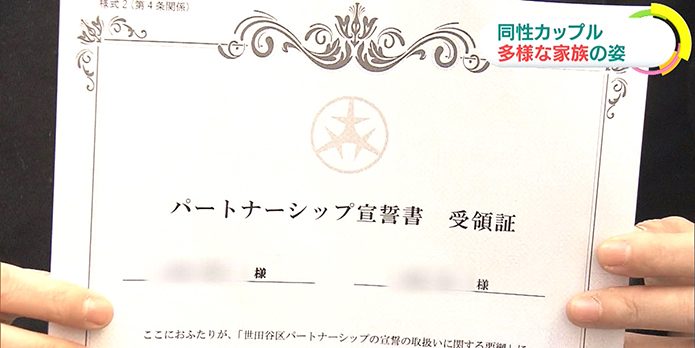
Advertising agency Dentsu Inc. estimates that there are about 10mn lesbian, gay, bisexual and transgender (LGBT) individuals in Japan, accounting for about 8% of the population. Yet, it was only in 2015 that articles about marketing to sexual minorities first appeared in the Nikkei Ryutsu Shimbun (a trade newspaper, also known as the Nikkei Marketing Journal) and other mainstream business publications.
The 23 April issue of the Weekly Toyo Keizai features the move, in April 2015, by Tokyo’s Shibuya Ward to create a “partnership system” for LGBT couples. It became the first municipality in Japan to issue an official document recognising same-sex unions. As of the end of March 2016, eight couples had so registered.
Meanwhile, its much larger residential neighbour, Setagaya Ward, offers a Pledge of Partnership system whereby same-sex couples submit to the ward office an oath of their commitment. The ward office will then issue a certificate confirming receipt of it.
The cities of Iga in Mie Prefecture, Takarazuka in Hyogo Prefecture, and Naha in Okinawa Prefecture, are currently setting up a system similar to that of Setagaya.
In April 2016, a number of major Japanese corporations—including Panasonic Corporation and the Dai-Ichi Life Insurance Company, Limited—adopted revisions of their work rules to allow an employee’s same-sex partner to be eligible for health insurance and other benefits.
In October 2015, broadcaster NHK conducted its first nationwide survey of 2,561 LGBT adults, of whom 46.0% were in their twenties, 23.2% in their thirties and 14.4% in their forties. Nearly half (47.6%) said they had a partner, while 50.1% said they did not. Only 6.2% said they had yet to “come out”.
When asked why they sought legal recognition of their union, the responses, in descending order, with multiple replies accepted, included:
- Wish to be treated as a family member when making medically related decisions
- The first step to legal recognition as a family unit
- Wish for equal treatment by an employer, as related to family allotments, compassionate leave, etc.
- To clarify rights related to inheritance of a spouse’s assets
- Consider it necessary in order to bring up children
- To facilitate legal status in Japan for a non-Japanese partner
- Other